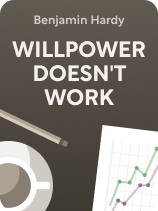

This article is an excerpt from the Shortform book guide to "Willpower Doesn't Work" by Benjamin Hardy. Shortform has the world's best summaries and analyses of books you should be reading.
Like this article? Sign up for a free trial here.
What is eustress, and how can it help you achieve your goals? How can you create this positive stress in your life?
In Willpower Doesn’t Work, Benjamin Hardy discusses the power of eustress, a healthy form of stress that keeps you focused and energized. He outlines three effective ways to harness this motivational force for your work, fitness, and creative projects.
Read more to learn how eustress can transform your approach to challenges and productivity.
Leveraging Eustress
Hardy says that, as you design your working environment, your first priority should be to create eustress. So, what is eustress? Eustress is healthy, manageable stress that keeps you focused and energized (as opposed to distress, which is distracting and tiring). You could also think of eustress as pressure or motivation; whichever term you prefer, it’s an external force that pushes you to do your best work.
Note that “work” in this context doesn’t just mean your job. Instead, Hardy suggests keeping eustress front-of-mind for anything that takes effort, such as fitness goals and creative projects.
| Eustress Is Distress Minus Danger The difference between eustress and distress is a sense of danger—when you feel challenged, but not threatened, you experience eustress. However, it’s important to note that your brain can’t tell the difference between emotional danger (such as rejection or shame) and physical danger; it experiences both as simply “danger.” Therefore, when designing your work environment, protect yourself from both kinds of danger to make sure you’re creating eustress. In The Upside of Stress, psychologist Kelly McGonigal says that positive stress triggers the challenge response. The challenge response prepares you for action by increasing your heart rate, causing you to breathe more heavily, sharpening your focus, and giving you a burst of energy. In fact, the challenge response is very similar to the more commonly known fight-or-flight response, with one crucial difference: Because you don’t perceive any danger, your body doesn’t tense up and your brain doesn’t flood you with stress hormones like adrenaline and cortisol. This is important because those responses to danger put you under a lot of physical and mental strain, leading to numerous health problems in the long run. For example, chronic stress (the bad kind) is linked to issues ranging from muscle pain and stomach upset to insomnia, anxiety, and addiction. In short, eustress provides all the productivity benefits of distress, but without the harmful side effects. |
3 Ways to Create Eustress
Hardy’s tips for creating eustress fall into three categories.
1. Challenging yourself. One of the most effective ways to create eustress is to set difficult goals because you’ll be motivated to work harder to reach those goals. This often means that the goal itself is ambitious, like doubling your income by the end of next year. However, it could also mean setting a goal that’s difficult for you personally, such as overcoming an injury or giving your house a top-to-bottom cleaning (if cleaning is something you struggle with).
(Shortform note: In The 10X Rule, entrepreneur and sales coach Grant Cardone offers a way to make sure you’re setting appropriately challenging goals for yourself: Set a reasonable goal, then multiply it by 10. For instance, if a reasonable goal for you is to earn $100,000 next year, your 10X goal would be to earn a million dollars. Like Hardy, Cardone says that challenging goals will motivate you to work harder; however, Cardone adds that falling short of a 10X goal still means you’ve probably accomplished more than you would have by meeting a reasonable goal.)
2. Trying new things. New experiences are powerful motivators. This is because when you’re trying something for the first time, you’re forced to focus completely and work much harder than usual to make sure you’re doing it correctly. This principle also applies to learning new information: You have to stay engaged in order to understand and retain what you’ve learned. Therefore, whenever it’s feasible, take opportunities to experience new things—for example, you might take on a new responsibility at work, or find a podcast that teaches you about a topic you’re interested in. Note that this category of eustress will have some overlap with the first category (challenge) because it’s often difficult to do something you’ve never done before.
(Shortform note: Trying new things is so motivating because of a chemical in your brain called dopamine. In The Molecule of More, psychiatrist Daniel Lieberman explains that your brain releases dopamine when you encounter something new, whether it’s new information or a new situation. That dopamine rush is highly pleasurable, which is why it’s so motivating—you want to learn new things and have new experiences because you know that doing so makes you feel good.)
3. Creating consequences for failure. Challenging goals can be motivational, but they can also be disheartening. Therefore, to keep yourself on track, make sure that there will be consequences for you if you fall short. One way to do this is by investing your own resources into a project, meaning that you’ll suffer a loss if the project fails—for example, if you sign up for guitar lessons and then don’t go to them, you’ll have wasted your money. Another approach is to create social consequences by publicly announcing your goals to your friends and family, or anyone whose opinion you value. Since you won’t want to disappoint those people or be publicly embarrassed by failing at what you promised to do, you’ll work harder to reach your goals.
| The Benefits of Having “Skin in the Game” Creating risk for yourself has several benefits, of which motivation is only one. In his book Skin in the Game, risk analyst Nassim Nicholas Taleb explains why some level of risk is good for you and for your work. First, like Hardy, Taleb says that you’ll work much more effectively if you have something to lose, such as money or reputation. You’ll be more focused, make more careful decisions, and put in more effort when something you value is on the line. Second, risk helps you to learn from your mistakes. It’s a common maxim that failure is the best teacher (even Yoda said so), but Taleb adds that this is only true when that failure costs you something. The motivation to learn from your mistakes comes from the pain of loss and the fear of losing more. Or, to look at this another way: If you don’t face any consequences for failure, all you’ll learn is that it doesn’t matter whether you succeed or fail. Finally, having skin in the game ensures that you’ll act more ethically, because you know that you’ll face consequences if you don’t. For example, if you run a business, you might be tempted to ignore some safety regulations so that your employees can work faster and more efficiently. However, if you’ve invested your own money into that business, the risk of getting fined for safety violations will most likely keep you honest—this is because it’s your money on the line, not just a faceless corporation’s profits. |

———End of Preview———
Like what you just read? Read the rest of the world's best book summary and analysis of Benjamin Hardy's "Willpower Doesn't Work" at Shortform.
Here's what you'll find in our full Willpower Doesn't Work summary:
- Why you can’t just “will” your way to success
- Practical ways to optimize your working and resting environments
- How you can make reaching your goals inevitable






